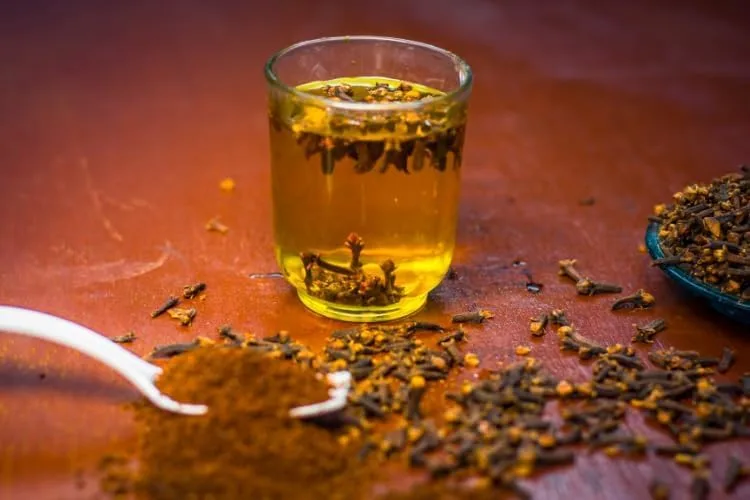It’s always the simplest things that end up surprising us. Like clove water. Sounds like something your grandma might’ve brewed when you were sick, right?
But lately, it’s been having a moment, from wellness influencers to traditional herbalists.
And for good reason. Clove water isn’t some flashy superfood; it’s humble, a little spicy, and surprisingly potent. Especially for women.
You might be sipping it to help with bloating, period cramps, skin breakouts, or just that sluggish, heavy feeling that sometimes shows up for no reason.
But under that spicy aroma is a whole mix of natural compounds doing far more than you’d expect.

What’s Actually in Cloves That Makes Them So Powerful?
At the heart of it is a compound called eugenol. It’s kind of the boss of clove’s benefits—an anti-inflammatory and natural anesthetic.
That warm, numbing effect you get from clove oil on a sore tooth? That’s eugenol doing its thing.
But when you steep cloves in water, you’re gently pulling out not just eugenol but also antioxidants, flavonoids, and a small dose of vitamins and minerals.
That might not sound revolutionary, but these natural components work together to create a gentle tonic that, when used consistently, can have subtle yet noticeable effects on women’s health.
Like balancing hormones, reducing inflammation, and soothing the digestive system.
Period Pains, Mood Swings & That Time of the Month
If you’ve ever had to pause your life because of cramps, you’re not alone. PMS can be brutal. Some women describe it as a pressure cooker of pain and emotions.
Clove water offers a little relief, not magic, but enough to matter.
Drinking clove water a few days before your cycle might help reduce cramping and inflammation. It’s thought to slightly relax the uterus and support circulation in the pelvic region.
Some women say it lifts that heavy, bloated feeling and makes their period a bit more bearable.
While formal research is limited, traditional medicine, especially in parts of Africa, India, and Southeast Asia, has used clove-based tonics for generations to ease menstrual discomfort.
Digestion Drama? Clove Water’s Got Your Back
There’s nothing glamorous about gas or bloating. And sometimes, women deal with it more frequently thanks to hormones or diet changes.
Clove water supports digestion in a few ways. First, it helps stimulate saliva and digestive enzymes, which break down food more effectively.
It also has mild carminative properties, meaning it helps reduce gas buildup in the gut. If you’ve ever felt puffy or uncomfortable after a heavy meal, a small glass of warm clove water could help settle things.
It’s not as immediate as popping an antacid, but it’s natural, gentle, and doesn’t mess with your gut flora.
Skin-Deep Beauty Benefits (Literally)
Here’s where it gets interesting. Clove water can also support your skin. Thanks to its antibacterial and anti-inflammatory effects, drinking it may help reduce acne, especially the kind that flares up around your jawline or during PMS.
And some women use clove water topically as a gentle toner. When diluted properly, it can help cleanse pores and soothe inflamed skin.
Just be careful, it’s strong stuff. Always patch test and never apply full-strength clove oil to your skin.
But drinking it daily? That can be a slow burn toward clearer, calmer skin from the inside out.
Goodbye Bloat, Hello Flat Belly Vibes
Let’s be honest: no one loves feeling bloated. Clove water’s reputation as a belly-flattening drink comes from its ability to reduce water retention, soothe gas, and mildly rev up metabolism.
Especially when paired with ingredients like lemon, cinnamon, or apple cider vinegar.
Some women use it as part of their morning routine, before coffee or breakfast. It kickstarts digestion, warms the gut, and helps flush out toxins.
Is it a miracle drink? No. But it supports the things that matter—like consistent digestion, less bloating, and better hydration.
Oral Health Isn’t Just a Minty Topic
There’s a reason clove oil is still used by dentists; it works. It numbs pain and kills bacteria.
Clove water isn’t as potent, but it can be a decent natural mouth rinse. It freshens breath and may reduce oral inflammation.
Just don’t swish with it too often. Cloves are strong, and overdoing it can irritate sensitive gums.
A few times a week is enough. If you’re prone to mouth ulcers or gum sensitivity, test it gently and dilute well.
Clove Water & Immunity: Grandma Might Be Right
Clove tea or clove-infused water has long been a go-to for coughs, sore throats, and mild infections.
It’s warming, antimicrobial, and comforting in a way that ginger or turmeric drinks are too.
Sipping it warm helps loosen phlegm and calm inflamed throat tissue.
If you feel something coming on, adding cloves to your herbal routine can be a comforting, immune-friendly boost.
Again, not a cure, but a helpful little ritual, especially in colder seasons.
Fertility, Libido, and That Other Side of Health
Here’s where it gets a bit complicated. In some cultures, clove water is believed to support fertility and increase libido in women.
It’s said to balance hormones, improve cervical mucus, and stimulate the reproductive system.
That said, there’s not a ton of clinical evidence here. But it’s hard to dismiss generations of anecdotal use.
Some women say it gives them more energy, improves their cycle regularity, and yes, enhances libido.
It might bea placebo, or it might be that supporting overall circulation and hormone health has those side effects. Either way, it’s worth exploring if you’re curious.
How to Make Clove Water Without Ruining It
There are two main methods: soaking and simmering. Both work, but they give slightly different results.
Basic Soak Method:
- 4–6 whole cloves
- 1 cup of warm water
- Let soak overnight (8–12 hours), then strain
- Drink on an empty stomach in the morning
Boiled Method:
- 5–7 whole cloves
- 2 cups water
- Simmer gently for 10–15 minutes
- Let cool, then sip throughout the day
Some women add lemon, ginger, or cinnamon. Just don’t go overboard. Cloves are potent. One small cup a day is usually enough.
Any Side Effects? Yeah, Let’s Talk About That
Too much clove water can irritate the stomach, especially if you drink it on an empty stomach every day.
And if you’re pregnant or have a bleeding disorder, check with a doctor before using it regularly.
Signs you may be overdoing it:
- Nausea
- Heartburn
- Lightheadedness
- Skin sensitivity
Moderation is your friend. If your body doesn’t like it, don’t force it.
Real Women, Real Stories
Some say it’s helped regulate their cycle. Others swear their skin cleared up in a week.
One woman on Reddit claimed her period cramps were “cut in half” after two weeks of clove water.
Of course, everyone’s body is different. But when a traditional remedy keeps popping up in modern wellness spaces, it usually means there’s something to it.
Should You Try It? Here’s the Honest Take
Clove water won’t change your life overnight. But it might help ease a few symptoms that have been quietly bothering you, digestion, PMS, skin, or bloating.
It’s easy to make. It’s natural. And for many women, it just feels good. Like one of those small rituals that gives your day a gentle nudge in the right direction.
So maybe it’s not a miracle. But it might be a quiet helper.
And sometimes, that’s enough.

